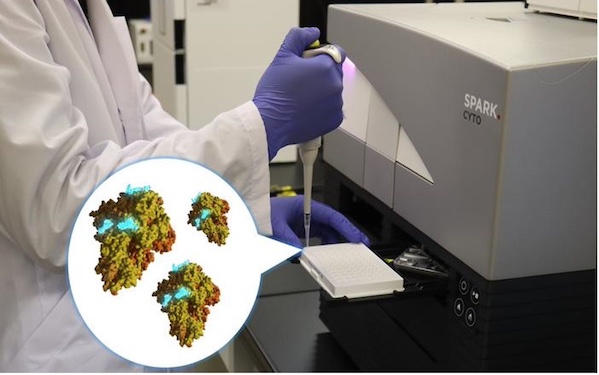One-Minute COVID-19 Test Adaptable For Detecting Other Viruses with Spike-Like Proteins
January 20, 2024
Source: drugdu
 255
255
 Several animals ranging from fireflies to lantern fish have the chemical tools needed to produce light. Such a reaction usually requires the substrate luciferin and the enzyme luciferase. However, a class of less discriminating luciferins, termed as imidazopyrazinone-type (IPT) compounds, has the ability to glow upon coming into contact with other proteins, including ones that are not considered to be enzymes. Previous studies have suggested that IPT luciferins could act as the basis for a new type of medical test that utilizes luminescence to indicate the presence of a target protein in a specimen. Now, a team of researchers has developed a glowing test, based on their belief that an IPT luciferin can react with the SARS-CoV-2 spike protein, which allows the virus particles to invade cells and cause COVID-19.
Several animals ranging from fireflies to lantern fish have the chemical tools needed to produce light. Such a reaction usually requires the substrate luciferin and the enzyme luciferase. However, a class of less discriminating luciferins, termed as imidazopyrazinone-type (IPT) compounds, has the ability to glow upon coming into contact with other proteins, including ones that are not considered to be enzymes. Previous studies have suggested that IPT luciferins could act as the basis for a new type of medical test that utilizes luminescence to indicate the presence of a target protein in a specimen. Now, a team of researchers has developed a glowing test, based on their belief that an IPT luciferin can react with the SARS-CoV-2 spike protein, which allows the virus particles to invade cells and cause COVID-19.
In their research, the team at the National Institute of Advanced Industrial Science and Technology (AIST, Ibaraki, Japan) focused on 36 different IPT luciferins, testing their capacity to react with a singular unit of the SARS-CoV-2 spike protein - the critical element that enables the virus to penetrate cells and cause COVID-19. Remarkably, only one of these molecules, derived from small crustaceans in the Cypridina genus, exhibited the ability to emit light. Further investigations were conducted on the luciferin’s interaction with the spike protein in its trimeric, or natural state. The results were promising, as detectable light emissions were observed within a 10-minute span. However, this light emission wasn't visible to the naked eye and required a commercially available luminescence reader.
The team also demonstrated the selectivity of this IPT luciferin as it did not produce light when exposed to six different proteins commonly found in saliva. This unique type of luminescence, termed “biomolecule-catalyzing chemiluminescence (BCL),” is a reaction initiated by biomolecules that aren't classified as luciferases. Importantly, the researchers found that this luciferin could determine the quantity of the spike protein present in saliva with the same level of accuracy as a method used in vaccine research, but much faster - delivering results in just one minute, a significant improvement over existing rapid point-of-care tests. The researchers envision this BCL-based method could serve as the basis for a straightforward “mix and read” test. It involves adding IPT luciferin to untreated saliva from an individual suspected of having COVID-19. This new approach could potentially be adapted to detect other viruses that have spike-like proteins, such as influenza, MERS-CoV, and different coronaviruses, offering a broad new avenue for virus detection.
Source:
https://www.labmedica.com/molecular-diagnostics/articles/294799949/one-minute-covid-19-test-adaptable-for-detecting-other-viruses-with-spike-like-proteins.html
Read more on
- The first subject has been dosed in the Phase I clinical trial of Yuandong Bio’s EP-0210 monoclonal antibody injection. February 10, 2026
- Clinical trial of recombinant herpes zoster ZFA01 adjuvant vaccine (CHO cells) approved February 10, 2026
- Heyu Pharmaceuticals’ FGFR4 inhibitor ipagoglottinib has received Fast Track designation from the FDA for the treatment of advanced HCC patients with FGF19 overexpression who have been treated with ICIs and mTKIs. February 10, 2026
- Sanofi’s “Rilzabrutinib” has been recognized as a Breakthrough Therapy in the United States and an Orphan Drug in Japan, and has applied for marketing approval in China. February 10, 2026
- Domestically developed blockbuster ADC approved for new indication February 10, 2026
your submission has already been received.
OK
Subscribe
Please enter a valid Email address!
Submit
The most relevant industry news & insight will be sent to you every two weeks.



